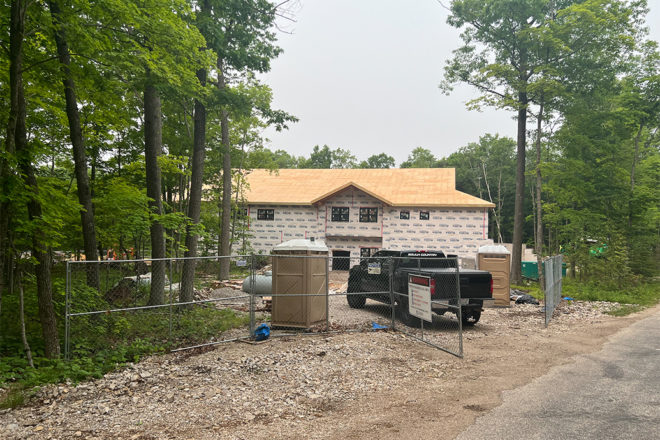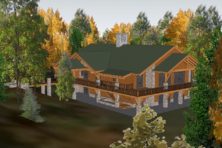Construction Continues as Camp Zion Fight Rolls On
- Share
- Tweet
- Pin
- Share

Eight years after neighbors first fought to halt construction of an expanding dining hall and gathering space at Camp Zion in Ellison Bay, the battle in the isolated corner of the peninsula continues.
Central to the fight between the 77-year-old religious camp on the Green Bay shore on Door Bluff Road is the camp’s construction of a 12,000-square-foot dining hall and conference space on land that it has acquired over the past 15 years across the road from its main camp property.
That land is zoned Heartland 3.5, allowing for uses such as camping facilities, community centers and retreat centers with an approved conditional-use permit (CUP). The building has a footprint of 6,000 square feet, with a dining hall for 150 on the second floor and two conference rooms on the first floor.
The camp sought a variance to the zoning code’s setback requirements to build an ADA-accessible ramp and move the structure closer than the required 102.5-foot setback from Door Bluff Road. By moving it closer, it would also allow for a short bridge off the slope for handicap accessibility to the second-floor dining hall. The bulk of the camp’s living quarters, offices and activity centers are located a short walk across a private road that bisects the camp property.
“It’s an important part of the camp experience that we can all dine together,” said Dale Stewart, executive director of Camp Zion, in 2020. “We can’t do that now.”
In July of 2020, the Door County Resource Planning Commission (RPC) unanimously denied the request, noting that the camp had ample room on its 31 acres to locate the building in a spot that complied with the setback requirement.

In response, Camp Zion took the county to federal court based on the Religious Land Use and Institutionalized Persons Act of 2000. The camp claimed that the county’s argument that the camp could locate the building elsewhere on the property and transport handicapped people by van or other means to the dining hall would create a substantial burden and violated the Americans with Disabilities Act.
On Sept. 30, 2021, the RPC went into closed session and emerged to vote unanimously to accept a settlement agreement with Camp Zion that would allow the project to continue without a variance required, while also granting the necessary conditional-use permit (CUP) for the project.
That closed door and the decision that emerged from it did not sit well with neighbors, who filed suit against the county for failing to follow the law and its own administrative rules when it entered into the settlement and issued the building and CUP without a public hearing.
A year and a half later, on April 27, 2023, Outagamie County Circuit Court Judge Mark McGinnis agreed, reversing the issuance of the CUP and stating that the camp must “follow the law for any building applications, variance applications and/or conditional-use permit applications.”
Camp Zion reapplied for a new CUP on May 22, but despite two letters that Mariah Goode, director of Door County Land Use Services, sent May 4 and May 11 informing them that continued construction is subject to penalties and civil action to stop construction, construction continued.
“They’ve been warned that if they continue construction, they are doing so at their own risk,” Goode said.
Stewart declined to comment on the current construction or the new application because of the legal issues surrounding the project.
On June 20, Mike Bahrke and four other Camp Zion neighbors (Heather Passow, Erik Peterson, Priscilla Peterson and James Maronek) filed for an injunction in Door County Circuit Court to stop work. A second hearing for the injunction is scheduled for Aug. 1.
“They have no building permit, no conditional-use permit, but the county isn’t enforcing it,” Bahrke said.
He said the county’s willingness to let Camp Zion thumb its nose at the order sets a bad precedent for developments throughout the peninsula.
Door County Corporation Counsel Sean Donohue declined to comment specifically about the Camp Zion case because of the ongoing litigation. However, he said that in cases where an order to cease construction is given, the county’s enforcement mechanisms are limited to seeking an injunction or fining the property owner, and that is at the discretion of the county. But the county also does not have the resources to send staff to visit a property in a remote part of the peninsula every day to monitor the issue.
The first step in Camp Zion’s new CUP application commenced July 12 when it went before the Liberty Grove Plan Commission, which decided to pass on the issue without comment “because of the long, ongoing litigious process,” said Plan Commission chair Nancy Goss. “We decided we did not, as a town, want to get pulled into that legal battle.”

Now it heads back to the RPC for a hearing at 1 pm, Aug. 10 on the requested CUP.
The camp’s CUP request does not include a variance – the camp moved the location of the building to comply with the setback requirements before starting construction. But neighbors remain wary for other reasons. Once the structure is built, they believe the next push from the camp will be to stretch limits to take full advantage of the building with additional events beyond the religious-based, outdoor experience for children that is at its core.
In addition to the weekly campers, the organization gets a steady stream of large delivery vehicles for food service, septic flushing and other needs that go into running the camp. Goode said the settlement agreement includes conditions that limit Camp Zion to no more than 156 campers on the entire property at all times.
“We bought our property here understanding there was a church camp here,” Bahrke said. “In the late 1990s, they hired an executive director to expand their business, and that is not what we all signed up for. When the Pepsi-Cola truck and big trucks go through here, we’re the ones who have to put up with the noise pollution.”




